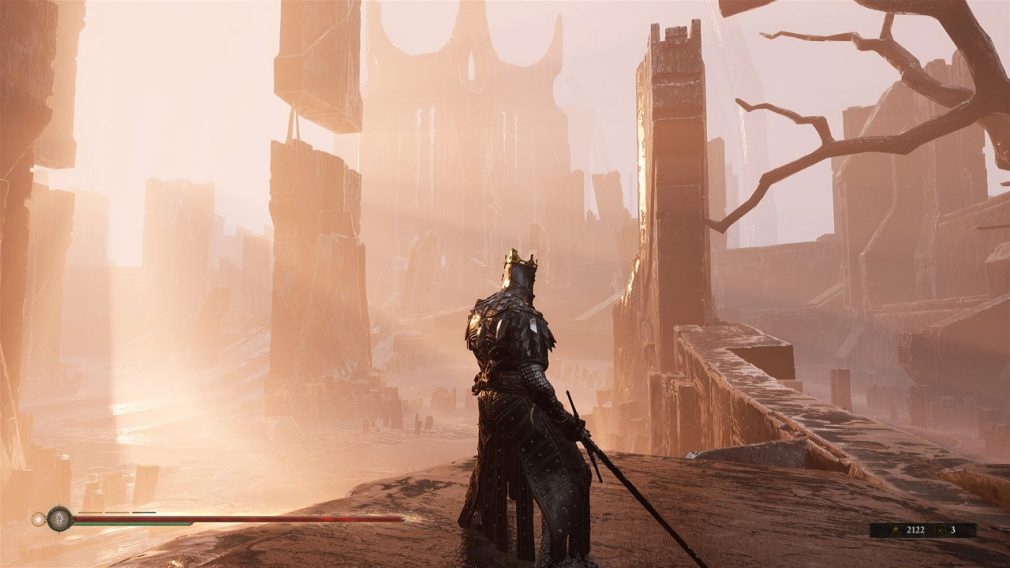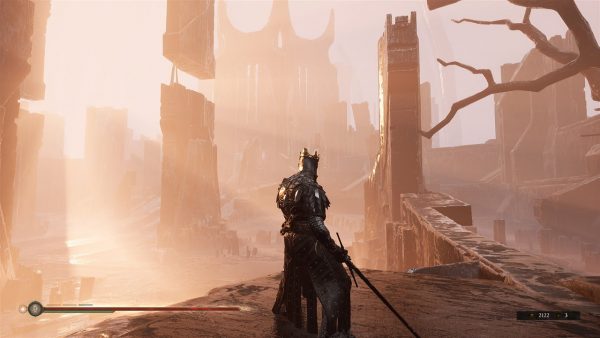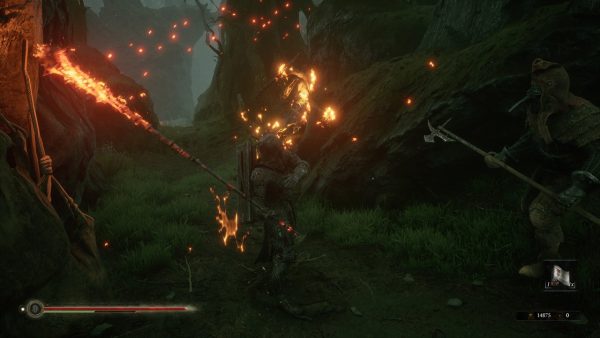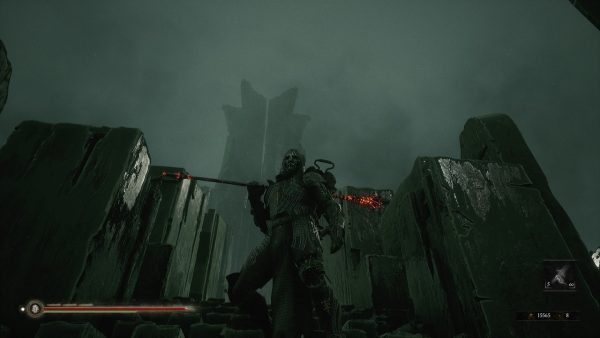Also On: Xbox One, PC
Publisher: PlayStack
Developer: Cold Symmetry
Medium: Digital/Disc
Players: 1
Online: No
ESRB: M
The small team at Cold Symmetry did not try and hide their love for Dark Souls with Mortal Shell. It wears that love on its sleeve like a badge of honor. Where Souls-like games such as The Surge, Code Vein, Lords of the Fallen, and Nioh take the familiar Souls format and change things up, making their own separate identity, Mortal Shell takes a different approach. Every aspect of Mortal Shell could have been pulled directly from a From Software game. The level design, the art direction, the unforgiving combat, the back and forth dance of blocking, dodging, and swinging, it all comes together and feels very much like Dark Souls.
True to the shell it intends to inhabit, (Hah!) Mortal Shell drops you right into the dismal fantasy world of Fallgrim, with virtually no explanation, and a big bad tutorial boss right there to whoop your ass and let you know what kind of game you?re playing. His purpose there is to teach you how the unique harden ability works, and how to dodge and swing your sword. After that brief yet painful first lesson, you crawl through the hollowed-out spine of some long-dead monster and find yourself in the forest/swamp of Fallgrim. Here wander various humanoid foes, who for some reason or another immediately dislike you and try to murder you. As is the case with any Souls game, even the most basic of enemies will take your life away if you get complacent around them.
The story is loose and told through item descriptions. One of the significant differences with Mortal Shell is how you get access to those descriptions. When you first pick up an item, it does not tell you what it does. Once you use it for the first time, you begin to gain familiarity with it. This allows you to see the primary function of the item, but to see further descriptions and learn of any secondary properties, you have to achieve familiarity level ten. Some items have to be used ten times, but some rarer items can reach familiarity ten after just one use.
Another significant departure that will give even the hardiest Souls veterans pause is the distinct lack of Estus or Estus equivalent. You can gather some healing items like mushrooms or roasted rats, but these are not plentiful and are just to be used in a pinch. Your primary method of regaining health is through the parry and riposte system, which allows a perfectly timed parry to open your opponent up for a powerful riposte that does substantial damage and heals you for a moderate amount. Even this is not available at first, only being made possible after acquiring a unique item. This makes the first hour or two of exploration pretty tough if you don?t know where to go right away.
After the initial acclimation period, Mortal Shell ends up being by far the easiest of the Souls or Souls-like games. Once you have a grasp of your chosen shell and weapon, as well as the harden mechanic, death is exceedingly rare. The only boss that was able to kill me was the final one, and even he only got me the one time as I learned the mechanics. To be fair, there are only a handful of bosses, seven in total, if you count the tutorial boss (who you will have to fight three more times to unlock the three other weapons). Seven bosses, three unique dungeon areas and the hub world, four shells, and four weapons. At first, I was concerned that this relatively short list of features would leave the game feeling empty and unfinished, and the lack of environments does to an extent. Still, for the most part, Mortal Shell understands what it is and doesn?t overstay its welcome or try to stretch itself out with unnecessary bloat.
There are four distinct environments in Mortal Shell. The hub area and most extensive section is the forest/swamp type area, and then there are three distinct dungeons. One is a gothic dungeon full of flaming sconces and tombs, one is an icy crevasse full of snow and vertical cliff faces, and one is an open, gigantic landscape full of towering obsidian obelisks. This last area is clearly where the majority of care and planning went and is the stand-out highlight of Mortal Shell. Populated with fierce enemies, puzzling teleporters, and some light environmental puzzling, this is by far the best part of the game. The other two areas are certainly not bad, but they are a bit generic and feel like more of an afterthought when compared to this masterfully crafted portion of the world. The hub area is by far my least favorite, and even now, as I near the end of my New Game+ run, I do not fully grasp where I am at times. It is all just so much of the same, with specific landmarks and ways to determine your position, but ultimately just a generic green-ish area, which is a bit disappointing considering how much time you have to spend here.
Mortal Shell is designed in such a way that if you are a Souls veteran, it will scratch that itch that it typically seems only Hidetaka Miyazaki can reach, while also being incredibly accessible to newcomers. If you are someone who has been on the fence, or maybe interested in the games but always put off by the length or difficulty, Mortal Shell is a great first choice. Coming in at a tight eight to twelve hours, depending on how fast you pick up on some of the mechanics, Mortal Shell ends right before it overstays its welcome. This is a small game made by a small team of only fifteen people but never feels like it is lacking. As I said above, Mortal Shell is a true love letter to Dark Souls and feels like a distilled version of the From Software masterpiece. Unique mechanics serve to separate it a bit and enhance the experience, but there is nothing here that will sell a person that just downright dislikes Souls games. Available for a modest $30, though, I strongly recommend it to any Souls fans or anyone who has ever been interested but hesitant to pull the trigger.
Note: PlayStack provided us with a Mortal Shell PS4 code/copy for review purposes.




